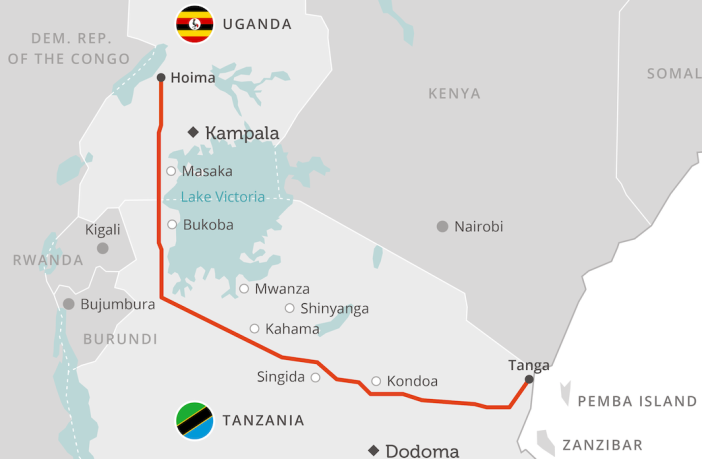- Today, the East African Court of Justice (EACJ) will hear arguments for and against the objection to the court’s jurisdiction filed by Secretary General of the East African Community, the Republic of Tanzania and Republic of Uganda in response to the case challenging the construction of the East African Crude Oil Pipeline (EACOP) until the questions of environmental, social justice, and climate justice concerns raised in the case are heard and determined.
On 6 November, 2020, Natural Justice, Centre for Strategic Litigation, the Centre for Food and Adequate Living Rights (CEFROHT) Limited, and Africa Institute for Energy Governance (AFIEGO) filed a case against the governments of Uganda and Tanzania and the Secretary General of the East African Community (EAC), challenging the construction of the EACOP at the EACJ. The applicants also applied for a temporary injunction to stop the construction of the EACOP until the questions of environmental, social justice, and climate justice concerns raised in the case are heard and determined. This application is yet to be determined by the Court.
The EACOP, if completed, would pump enough oil to add up to 34.3 million tonnes of carbon dioxide – around seven times the current emissions of Uganda and Tanzania – into the earth’s atmosphere each year, at a time of acute climate crisis. Such emissions are in sharp contrast to the core message of the International Energy Agency Net Zero Roadmap published in May 2021, that if the world is to stay below the 1.5° Paris Agreement goal, there is no need for any new oil infrastructure.
In addition, the project has been associated with a range of severe risks to communities, wildlife, forests and water resources, which BankTrack and partners have set out for financiers in a series of briefings. [5] Recently the Ugandan government has cracked down on community and national organisations that oppose the oil developments or work peacefully to support project-affected communities, arresting human rights defenders, attempting to close down civil society organisations, with Uganda’s President Museveni even publicly insulting civil society groups at the signing of the FID.
The Applicants’ case is premised on grounds that the EACOP project contravenes various provisions of the the treaty of the East African Community; the Protocol for the Sustainable Management of the Lake Victoria Basin; the African Charter on Human and People’s Rights; the African Convention on Conservation of Natural Resources; the post-2020 Convention on Biological Diversity and the Paris Climate Accords. Moreover the applicants contend that the project proponents, including French oil giant Total Energies, China’s National Offshore Oil Corporation, and the states of Uganda and Tanzania did not conduct effective and meaningful public participation and consultation, and neither did they conduct both human rights and climate impact assessments before the commencement of the EACOP project.
If the preliminary objection on the court’s jurisdiction is successful, the case shall be dismissed, and if the court determines that it has jurisdiction, then the matter shall proceed, and will be heard on merits.
Author: Bryan Groenendaal















